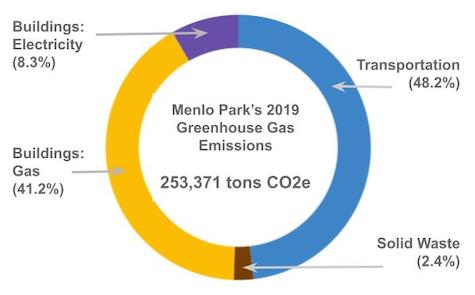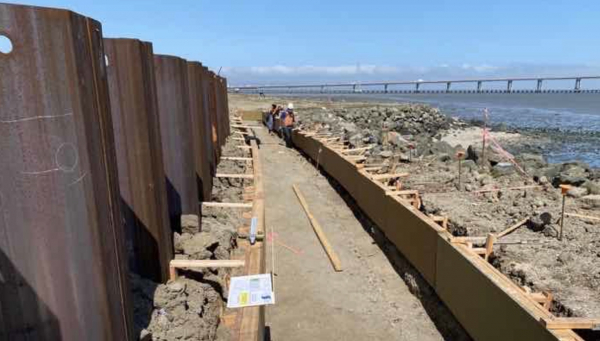But fully electrifying all of our homes? That is a big lift. It can be a hassle as a homeowner to understand the options or find a contractor. As a renter you may feel powerless. And even when it is quick and easy, it can be expensive. Although many emissions-reducing measures pay off immediately (e.g., flying less) or over time (e.g., driving an EV), home retrofits may not. In our area of high construction costs and relatively temperate weather, rebates and incentives are needed to keep even the most efficient electric heating appliances in the mix. (1)
Our mid-Peninsula cities are struggling with this. While some residents are able to do the work and in some cases pay a premium to reduce their emissions, others are not. Yet 30-40% of our municipal emissions come from buildings. We must make it simpler, more convenient, and less expensive to electrify. Menlo Park is exploring a partnership with a company named BlocPower that promises to do all that and more, with a special focus on low-income households. (2) What might that look like, and what hopes would you have for this partnership?

Over 40% of Menlo Park's emissions come from gas used in buildings. Source: Menlo Park Climate Action Plan Progress Report, 2021
BlocPower was founded by CEO Donnel Baird in New York City in 2014 after he grew frustrated trying to decarbonize buildings during the Obama administration. The work was too slow and too costly. His company aims to deploy intelligent automated analysis, trained technicians, and generous financing to provide “Greener, smarter, healthier buildings for all”. Baird describes their services as a “turnkey electrification program that includes project management, incentive coordination, contractor and equipment procurement, and financing (if desired)”. They aim to reduce the hassle of electrifying by providing expert advice and training a skilled workforce; to speed up the process with automated tools and streamlined permitting; and to reduce the costs by identifying and securing incentives and negotiating discounts on equipment and loans. As an example of the latter, BlocPower recently won a grant to help retrofit 10-12 affordable multi-family housing units in San Luis Obispo with heat pumps. They have proven this model by updating over 1000 buildings to date, mostly in New York City but increasingly across the country.
The BlocMaps tool is designed to analyze buildings and identify the best options for electrifying and/or improving efficiency. The idea is that you type your address into the BlocPower site and it will provide custom guidance for that building, similar in concept to Google’s Project Sunroof. The functionality is limited right now, but the Bezos Earth Fund recently awarded BlocPower a $5.5 million grant to add another 125 million buildings to their data set and ensure that owners across America have easier access to a sustainability plan for their building.
Workforce training is a core element of Baird’s vision for BlocPower. “In low-income communities, there’s a waste of energy and there’s a waste of human potential,” Baird has said. The company augments the local workforce by training disadvantaged residents in the trades, paying them to attend classes that will set them on a potentially lifelong, well-paying career in their local community. BlocPower is proud to have trained over 800 young adults in New York City, paying them $20/hour during their training and ultimately creating over 1000 green jobs in the city.
BlocPower is careful to explain that they are not a contractor and they do not directly employ these or other tradespeople that execute the projects. They are happy to work with all local contractors, though some certifications may be needed for warrantied work. (3) Baird views BlocPower’s role as a “concierge” that helps to coordinate homeowners with contractors, and points out that they need to be flexible. “Every resident is different. You may have a guy or a gal that you like to use in your home…. Another homeowner may have five people come over and ask us ‘Could you review these five?’ Someone else might say ‘I just want you to send me somebody that you trust, that you guys will stand behind, and that the city of Menlo Park feels good about,’ and we can do that…. When you’re talking about decarbonizing hundreds or thousands of buildings, there’s a lot of different scenarios that emerge. Our job is to be a flexible provider of the resources that are needed to make a decision and to implement the project.”

Much of Baird’s focus, and where he sees BlocPower adding the most value, is on retrofitting low-income housing. This work includes not only electrification and energy efficiency, but also lead/mold/asbestos remediation, wifi capability, and more. The low-interest financing comes with a 15-year guarantee and no debt, so it’s low-risk for the households. There is no lien on the building, and BlocPower has in the past done annual inspections that include air filter maintenance, refrigeration checks, and fan adjustments. At the end of 15 years the equipment transfers to the owner. Menlo Park is committed to ensuring that all low-income loans are 0% interest through a combination of government and philanthropic grants.
Menlo Park’s council members asked some good questions in a discussion about this partnership. Councilmember Ray Mueller asked how important it is that BlocPower partner with the city versus do this on its own. BlocPower is a for-profit company (4), and the city takes some risk by putting its “stamp of approval” on the company. Grace Park-Bradbury, the GM for BlocPower in the west, said that a partnership sends an important signal to contractors and equipment providers that Menlo Park’s home electrification market is worth investing in. Environmental Quality Commissioner Angela Evans added that it makes it easier for BlocPower to negotiate better discounts, to staff up, to build their training programs, and to raise capital. Baird also explained that it is very helpful for BlocPower to have access to the city’s permitting system, because they will be processing many permits at once and need to know and modify the status of all of the projects. The City of Ithaca, which recently brought on BlocPower to help electrify its 6,000 buildings, is augmenting its permitting department with 5-7 graduate students to help with the work needed.
Councilmember Drew Combs raised a related concern, namely that granting what amounts to a “preferred vendor” status could be problematic for the City. For example, what if other contractors found that their permits were not moving through as quickly, because (perhaps) some of the permitting staff were paid for by BlocPower? Baird insisted that any improvements they made to permitting would be equally available to all. “From our standpoint, the more market participants that come in to decarbonize Menlo Park, the quicker Menlo Park can decarbonize. There are 1000 other cities across America that need to be decarbonized.” (5) He said that BlocPower would never prohibit the city from developing other public/private partnerships. (6)
Combs also asked whether, given the pressure from the city to electrify and the for-profit nature of BlocPower, residents would be given an opportunity to get independent financial advice about the decision they were making. “If someone’s signing something that obligates them for 15 years, would someone be advising them ‘This is your job stability history, this is the additional debt that you have, and this is how this fits into that whole picture.’ … I don’t want to engage in a situation where we are putting residents in financially precarious situations, where they are taking on financial responsibilities that they really shouldn’t be taking on.” Baird was very receptive to that idea, and said they could explore doing something like that for Menlo Park, though they haven’t done something similar to date.
Vice Mayor Jen Wolosin asked about transparency and reporting frequency, and how to address the risk that landlords will raise rents unfairly in response to doing this work. These are all good questions that can be worked out in the partnership agreement and during the initial multi-year trial period with the city.

BlocPower is beginning to green buildings across America’s urban centers
BlocPower is an ambitious company. They have done projects in 5000 homes in over 1200 buildings, most in New York City, though they have done work in 24 cities across the country, including Los Angeles, Oakland, Chicago, Milwaukee, Atlanta, and Savannah. They believe they can reduce our country’s greenhouse gas emissions by 3 to 25 percent in 5 to 10 years. Menlo Park is not the urban core that they normally focus on, but there is certainly plenty of low-income housing on the peninsula that would benefit from BlocPower’s efforts and that represents an important component of our climate goals.
My question for you (readers) is, what would you like to see from an “electrification concierge”, or BlocPower specifically, and what concerns might you have. My short wish list would be:
- I would have BlocPower focus almost exclusively on lower-income housing. It is their sweet spot, where they can provide the most value, and it is an area where we particularly need help. If we are ever to price gas to account for externalities, which I know many here want to do, we have to aggressively and proactively help lower-income households to move away from gas.
- I would look to BlocPower’s training programs and sheer scale of projects to help grow the workforce to help households of all income levels electrify.
- I would particularly look for price transparency from BlocPower, and for BlocPower to help us to formulate a pricing structure that could be used as a basis by anyone looking to electrify. For example, we could begin to get a handle on appropriate equipment and labor costs for various types of HPWH installations. We are currently experiencing something of a “race to the top” in terms of pricing, and we must get control over that if we are to meaningfully accelerate our electrification efforts.
- While BlocPower will be collecting data on the benefits of its projects, in part to qualify for various crediting programs, I would want them to share that data and also publish data on other aspects, such as costs, how long the project took, how satisfied the tenants are after one year, and so forth.
- At some point we will need to have electrification mandates beyond new construction to achieve our emissions goals. That might be something like electrifying on home sale or large remodel, electrifying on appliance replacement, etc. There may need to be exceptions to those mandates, and a foundation that supports BlocPower’s work retrofitting low-income homes might be a great designation for “in lieu” fees for exceptional cases.
A small, wealthy city like Menlo Park is not the target market for BlocPower. But that doesn’t mean it’s a model that won’t work, particularly if we can extend it across the mid-Peninsula. I hope that we can take advantage of the dedication and enthusiasm of many of Menlo Park’s environmental leaders, and much of the Menlo Park city council, to find a way to use BlocPower’s planning and funding strengths, coupled with the strengths of our local building community, to make good headway on one of our most difficult climate goals.
I’d love to hear your thoughts in the comments below.
Notes and References
0. The town of Atherton will be hosting an Earth Day Festival in Holbrook-Palmer Park on Saturday, April 23 from 11am - 3pm. Stop by to hear from some terrific speakers, try your hand at electric leaf blower bowling(!), take a spin on an e-bike, and more. Mountain View’s Earth Day festival will be at the same time at the Mountain View Senior Center. Swing by to test-drive an EV, try some vegetarian food (free if you come early), and more. Palo Alto has a number of upcoming events, which you can read about here.
1. High electricity prices don’t help either, though I hope those will be changing soon. Palo Alto already has electricity prices that encourage electrification, but still the temperate weather means the energy use, and so the energy savings, are not especially big.
2. You can find the Menlo Park staff report on BlocPower here, and video of a discussion with City Council here.
3. In Oakland, for example, BlocPower retrofitted homes by working with local company Revalue.io. That company did much of the hands-on work, while BlocPower focused on the funding.
4. BlocPower can earn revenue from (for example) financing loans, selling credits they receive for emissions reductions, issuing “Environmental Justice Impact Green Bonds” to investors, and in some cases verifying positive health impacts from the work they are doing.
5. BlocPower has inked a contract with the Department of Energy to provide “technical assistance” to cities across America to reduce their building emissions.
6. The draft partnership agreement does say that Menlo Park would “Endorse the Program Manager as an exclusive procurement entity for the purpose of securing bulk purchasing agreements.” I haven’t received feedback on what this entails or what the purpose is.
Current Climate Data (March 2022)
Global impacts, US impacts, CO2 metric, Climate dashboard
Comment Guidelines
I hope that your contributions will be an important part of this blog. To keep the discussion productive, please adhere to these guidelines or your comment may be edited or removed.
- Avoid disrespectful, disparaging, snide, angry, or ad hominem comments.
- Stay fact-based and refer to reputable sources.
- Stay on topic.
- In general, maintain this as a welcoming space for all readers.




